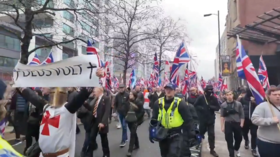NSA: An Orwellian surveillance system gone global
While British politics and media display a strong reluctance to confront the harsh realities of UK spying, we should be worried about further revelations of a dystopian, Orwellian surveillance system gone global, former MI5 agent Annie Machon told RT.
Thousands of attendees have gathered for the annual four-day Chaos Communication Congress in Hamburg, which is dedicated to information technology. The conference offers a generally “critical-creative attitude towards technology and the discussion about the effects of technological advances on society,” according to its website.
Speaking at the Congress Friday, journalist Glenn Greenwald condemned the mainstream media and accused his colleagues of failing to challenge the erroneous remarks routinely made by government officials around the globe.
RT:In his address, Glenn Greenwald was pretty tough on his fellow journalists. Is he right? After all - a little concession - British TV did show that alternative Christmas speech from Edward Snowden.
Annie Machon: They did, yes. But there has been a concerted ‘turning the blind eye’ by most of the national media in the UK since Snowden came out. There are a whole range of different mechanisms that the government and intelligence agencies can use to control the media within the UK when they’re reporting on spy stories- not least things like the defense press advisory notice, which is self-censorship by the media, as well as threatening them with prosecution under the official secrets act - as they did with the Guardian - and prosecuting individual journalists. So there has been a woeful lack of meaningful discussion - not only within the British media, but also within the British political classes. It's interesting; as you say, I'm in Hamburg. I’m going to be talking at the CCC tomorrow night about these sorts of issues too. It’s great to see the biggest chaos computer club gathering yet of people from across the world (and particularly Europe) who are very angry about this. They cannot guarantee that their governments can protect their privacy anymore, so they want to take it into their own hands - and quite right.
RT:As for the list of leaks that sparked all this debate in the first place - Greenwald says more revelations are to come. But every new leak seems less surprising. Are we just becoming immune to it now?
AM: I hope not. I think we should be scared of what Snowden has disclosed. He's done the world a service and he sacrificed his own way of life for that too. I think there will be more and more serious revelations coming out. We’ve only seen the tip of the iceberg. It’s great that there is a debate in America about constitutional rights – but it’s so much pantomime. Even if a decision is made within the US establishment to rein in the powers of the NSA within the USA, they can still investigate the rest of us around the world; we have no rights under their law. Then of course, their partners- like the British GCHQ or European intelligence agencies – can still spy on the US systems and give that information to the NSA. What we’re looking at is a panopticon – a sort of dystopian, Orwellian surveillance system that’s gone global. And this is why protecting our own rights, our own privacy, and taking that control into our own hands is so key.
RT:Snowden says he’s satisfied with the job he’s done now. Do you really think he’s going to come out with anything more?
AM: I don't think it's in Snowden’s hands anymore, bearing in mind he has temporary asylum in Russia on the understanding that he won’t leak anything further. But he can’t control what Glenn Greenwald or Laura Poitras or any of the other journalists who have been working with him have in their possession and want to push out. So I think there will be a lot more revelations coming out, a lot more very fundamental disclosures. Like I said, I think we’ve just seen the tip of the iceberg. I think it’s going to get horrendous, what we learn over the coming year, about how our basic privacies, our basic freedom, our basic free media to think freely and speak freely have been eroded by this global spy panopticon.
The statements, views and opinions expressed in this column are solely those of the author and do not necessarily represent those of RT.













